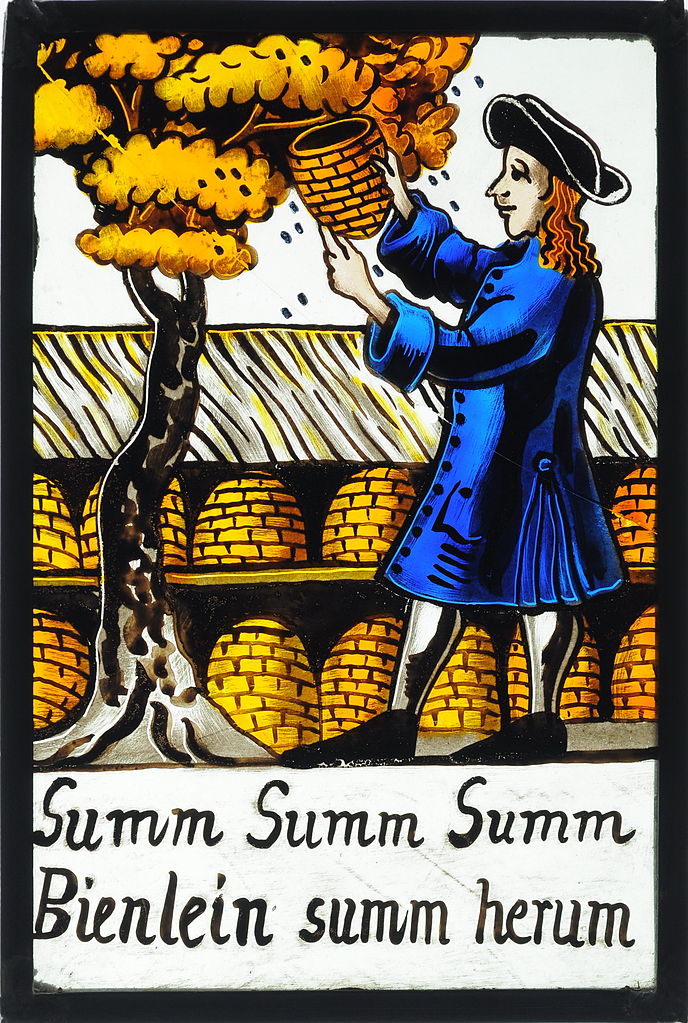All Nature seems at work. Slugs leave their lair—
The bees are stirring—birds are on the wing—
And Winter slumbering in the open air,
Wears on his smiling face a dream of Spring!
And I the while, the sole unbusy thing,
Nor honey make, nor pair, nor build, nor sing.
Yet well I ken the banks where amaranths blow,
Have traced the fount whence streams of nectar flow.
Bloom, O ye amaranths! bloom for whom ye may,
For me ye bloom not! Glide, rich streams, away!
With lips unbrightened, wreathless brow, I stroll:
And would you learn the spells that drowse my soul?
Work without Hope draws nectar in a sieve,
And Hope without an object cannot live.
Samuel Taylor Coleridge, Work without Hope (Lines composed 21st February 1825)
Coleridge’s poem about the birds and the bees is structured around the common association of both with work and sex (what the poet demurely calls ‘Hope’). Birds build nests and ‘busy bees’ construct hives and make honey. Birds might be more renowned for ‘pairing’, but a long tradition also connects bees with sex.
Birds do it, bees do it
Even educated fleas do it
Let's do it, let's fall in love
Cole Porter
In the texts that Schubert set to music the association is explicit.
Wo weht der Liebe hoher Geist?
Er weht im Abendglanz,
Er weht im Sternenkranz;
Wo Bien' und Maienkäfer schwirren,
Und zart die Turteltauben girren.
Where is the noble spirit of love stirring? . . .
It is stirring in the glow of evening,
It is stirring in the circle of the stars;
Where bees and May bugs buzz,
And where turtle doves coo tenderly.
Leon, Die Liebe D 522
In ä Garte
Bin i gstande,
Ha de Imbli
Zugeschaut;
Hänt gebrummet,
Hänt gesummet,
Hänt Zelli
Gebaut.
. . .
Und da kummt nu
Der Hansel,
Und da zeig i
Em froh,
Wie sie's machen,
Und mer lachen
Und machen's
Au so.
In a garden
Is where I stood
As I watched the bees,
I had a good look;
They buzzed,
They hummed,
They built a hive
They built it.
. . .
And then along came
Johnny,
And I showed
Them to him cheerfully,
How they did it,
And he laughed more
And he did
Just what they did.
Goethe, Schweizerlied D 559
Die Bienen summen durch das Gras
Und hängen an den Blüten;
Das macht mein Auge trüb und nass,
Ich kann mir's nicht verbieten.
Ihr süßen Lippen, rot und weich,
Wohl hing ich nimmer so an euch.
The bees buzz through the grass
And attach themselves to the blossoms;
That makes my eyes go blurred as tears well up,
I have no control over it.
You sweet lips, red and soft,
I definitely never attached myself to you in the same way!
Schulze, Im Walde D 834
There is one exception to this pattern and it is perhaps not coincidental that it is in a text by a female poet. Caroline Pichler’s Ferne von der großen Stadt (Far from the big city) is a Rousseau-esque fantasy about how much better life would be in the midst of nature away from the distractions of so-called civilisation.
Mein zufriednes Herz erfreut
An den selbstgepflegten Keimen,
An den hoffnungsvollen Bäumen
Sich mit Mutterzärtlichkeit.
Wenn die Blumen sich vermählen
In der Sonne mildem Licht,
Will ich jede Blüthe zählen,
Die mir süße Frucht verspricht.
Meine Bienenrepublik
Summet dort im Lindenschatten,
Bringt von blumenvollen Matten
Mir des Honigs Gold zurück;
Auf des Hügels trocknem Rasen
Halb im Schatten hingestreckt,
Seh ich meine Lämmer grasen,
Die das feinste Vlies bedeckt.
My contented heart takes pleasure
In the seeds that I myself have looked after,
In the hopeful trees
That I look after with a mother's tenderness.
When the flowers get married
In the gentle light of the sun
I shall count every blossom
Which promises me sweet fruit.
My republic of bees
Is buzzing over there in the shadow of the lime tree,
From the meadows full of flowers it is bringing
Me back the gold that is honey.
On the dry grass of the hill,
Lying out half in the shade,
I can see my little lambs grazing
Covered in the finest fleece.
Pichler, Lied (Ferne von der großen Stadt) D 483
Here the bees are celebrated for their work and for their cooperation. Pichler even calls the hive a ‘republic’. There is no monarchy, no Queen bee, here!
☙
Descendant of:
AnimalsTexts with this theme:
- Trinklied im Mai, D 427 (Ludwig Christoph Heinrich Hölty)
- Lied (Ferne von der großen Stadt), D 483 (Caroline Pichler)
- Die Liebe (Wo weht der Liebe hoher Geist?), D 522 (Gottlieb von Leon)
- Schweizerlied, D 559 (Johann Wolfgang von Goethe)
- Pause, D 795/12 (Wilhelm Müller)
- Im Walde (Ich wandre über Berg und Tal), D 834 (Ernst Konrad Friedrich Schulze)


